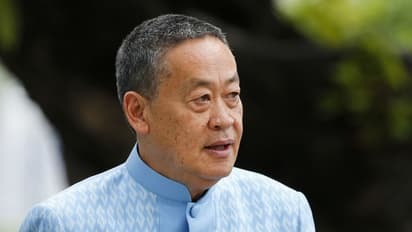Thailand PM Srettha Thavisin removed from office over constitutional violation, Wechayachai to be caretaker

Synopsis
Thailand's Constitutional Court ousted Prime Minister Srettha Thavisin from office on Wednesday, following a ruling in an ethics case that has plunged the kingdom into renewed political instability.
Thailand's Constitutional Court ousted Prime Minister Srettha Thavisin from office on Wednesday, following a ruling in an ethics case that has plunged the kingdom into renewed political instability. The judges, in a 5-4 decision, determined that Srettha violated regulations by appointing a lawyer with a criminal record to his cabinet. This case was initiated by a group of former senators who were appointed by Thailand's previous ruling junta.
This ruling comes just a week after the same court disbanded the main opposition party, Move Forward Party (MFP), and imposed a 10-year political ban on its former leader.
"The court rules by a majority of five to four that the ministerial position of the prime minister is terminated under the constitution, because he has not shown honesty in appointing this minister," Judge Punya Udchachon said in reading the court's judgment.
Punya stated that Srettha must have been aware of lawyer Pichit Chuenban's 2008 conviction when he appointed him to the cabinet.
"The appointment of the second respondent (Pichit) shows the first respondent (Srettha) has no honesty and breached ethical standards," Punya added.
Deputy Prime Minister and Minister of Commerce Phumtham Wechayachai will assume the role of acting prime minister during this period of political transition. The lower house of parliament is expected to select a new prime minister from the pool of candidates nominated by parties prior to last year's election. Candidates must secure the support of more than 25 MPs to be considered for the role.
The Constitutional Court's decision comes less than a year into Srettha Thavisin’s tenure, amid growing political and economic uncertainty in Thailand. Srettha, a real estate tycoon with no prior political experience, faced allegations of constitutional breach for appointing Pichit Chuenban, a lawyer with a past criminal conviction, to his cabinet. Chuenban had been briefly imprisoned in 2008 for contempt of court, though allegations of bribery were never substantiated.
Srettha has consistently denied wrongdoing, asserting that his appointments were made in good faith and in line with the needs of the country. "We’ve done our best and have submitted closing statements. I’ve set up plans based on the people’s needs and the caretaker PM can consider them," Srettha stated prior to the verdict.
The ruling adds to Thailand’s history of political upheaval, marked by frequent coups and judicial interventions that have repeatedly destabilized the country’s governance. Just last week, the Constitutional Court dissolved the anti-establishment Move Forward Party, further intensifying the political landscape.
The timing of the court's decision poses significant challenges for Thailand's economy. The government had projected a modest 2.7% growth rate for 2024, and the country’s stock market has underperformed, with a 17% decline year-to-date.
Potential candidates for the new prime ministerial role include Paetongtarn Shinawatra, daughter of former Prime Minister Thaksin Shinawatra; former justice minister Chaikasem Nitisiri; interior minister and deputy premier Anutin Charnvirakul; energy minister Pirapan Salirathavibhaga; and Prawit Wongsuwon, a former army chief known for his involvement in past coups.
Check the Breaking News Today and Latest News from across India and around the world. Stay updated with the latest World News and global developments from politics to economy and current affairs. Get in-depth coverage of China News, Europe News, Pakistan News, and South Asia News, along with top headlines from the UK and US. Follow expert analysis, international trends, and breaking updates from around the globe. Download the Asianet News Official App from the Android Play Store and iPhone App Store for accurate and timely news updates anytime, anywhere.